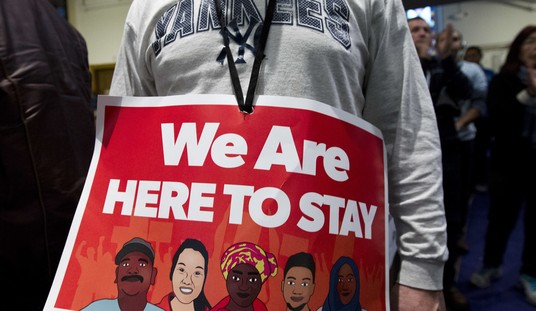As if they didn’t have enough problems in jamming a government reordering of the American health-care system already, Democrats plan to add another nationalization program to the bill. The Hill reported last night that Democrats want to “twin” the ObamaCare and student-loan bills to get them both passed and off the table:
Senate Democratic leaders have decided to pair an overhaul of federal student lending with healthcare reform, according to a Democratic official familiar with negotiations.
“It’s going in,” said the Democratic source, in reference to the student lending measure.
But leaders may have to reverse themselves if they receive strong pushback from Democratic colleagues who represent states where lenders employ hundreds of constituents.
Jim Manley, a spokesman for Senate Majority Leader Harry Reid (D-Nev.), said no final decision has been made.
“We’re still looking at the options,” Manley said.
The only way this makes sense is if the Democrats want an excuse for a failure to pass ObamaCare. Some of the Democrats supporting the health-care bill already oppose the nationalization of the student-loan industry. Adding them together won’t increase support for either program, but more likely will decrease support for a bill that’s already choking on its own massive size.
Why does Reid need to twin these bills? He doesn’t have 60 votes to get to a floor vote. Instead, he wants to use reconciliation, but pulling out that card again in this cycle will be a political loser. Combining the bills means Democrats only have to take a political beating over its use once.
This doesn’t apply directly to the House’s efforts, where the student-loan nationalization bill has already passed, but it will have some impact nonetheless. The White House and Nancy Pelosi are attempting to convince reluctant Democrats that parallel bills addressing concerns over abortion and taxation will get approved in the Senate, as long as the House acts first to pass the Senate’s version without amendment. If the Senate starts burdening that effort with unrelated bills for other government takeovers, they will undermine their credibility on these pledges.
The Wall Street Journal reminds Senators just how bad this bill will be:
Secretary of Education Arne Duncan portrays the changes as eliminating subsidies to private companies, but no one should misinterpret these comments to mean that taxpayers will benefit. The plan that passed the House includes $67 billion in “savings,” according to a Friday estimate from the Congressional Budget Office. But the bill also has more than $77 billion in new spending.
The net loss to taxpayers isn’t limited to $10 billion. After inquiries from Senator Judd Gregg (R., N.H.) and Rep. John Kline (R., Minn.) last year, CBO explained that “savings” estimates are artificially high because of government accounting rules that undercount the risks of default when the government is originating the loans, while the new spending estimates are artificially low. This could be significant. Many colleges oppose the government plan specifically because the feds don’t make the same effort to prevent defaults that the private lenders do.
Taxpayers have even more reason than academics to fear the impact, in part because the public may not learn the details before this plan becomes law. Democrats aim to bring their education revolution to the floor without a committee vote or even a hearing in the Senate.
As did the CBO:
“Various changes that the President proposes to the Pell Grant program would add another $0.2 trillion to the deficit between 2011 and 2020,” CBO said Friday. That could turn out to be a very optimistic estimate if unemployment remains high and more people seize the educational opportunity to which they have just become entitled. Still another taxpayer trap will be sprung if the President’s proposal to forgive some debt incurred by “overburdened” borrowers is included in the bill.
The biggest political risk is in tying two government takeovers so closely together. The student-loan nationalization bill has mostly flown under the radar this session. Democrats will give it a much higher profile, and at the same time underscore the radically statist nature of their agenda. Don’t expect this idea to last too long under the spotlight.








Join the conversation as a VIP Member